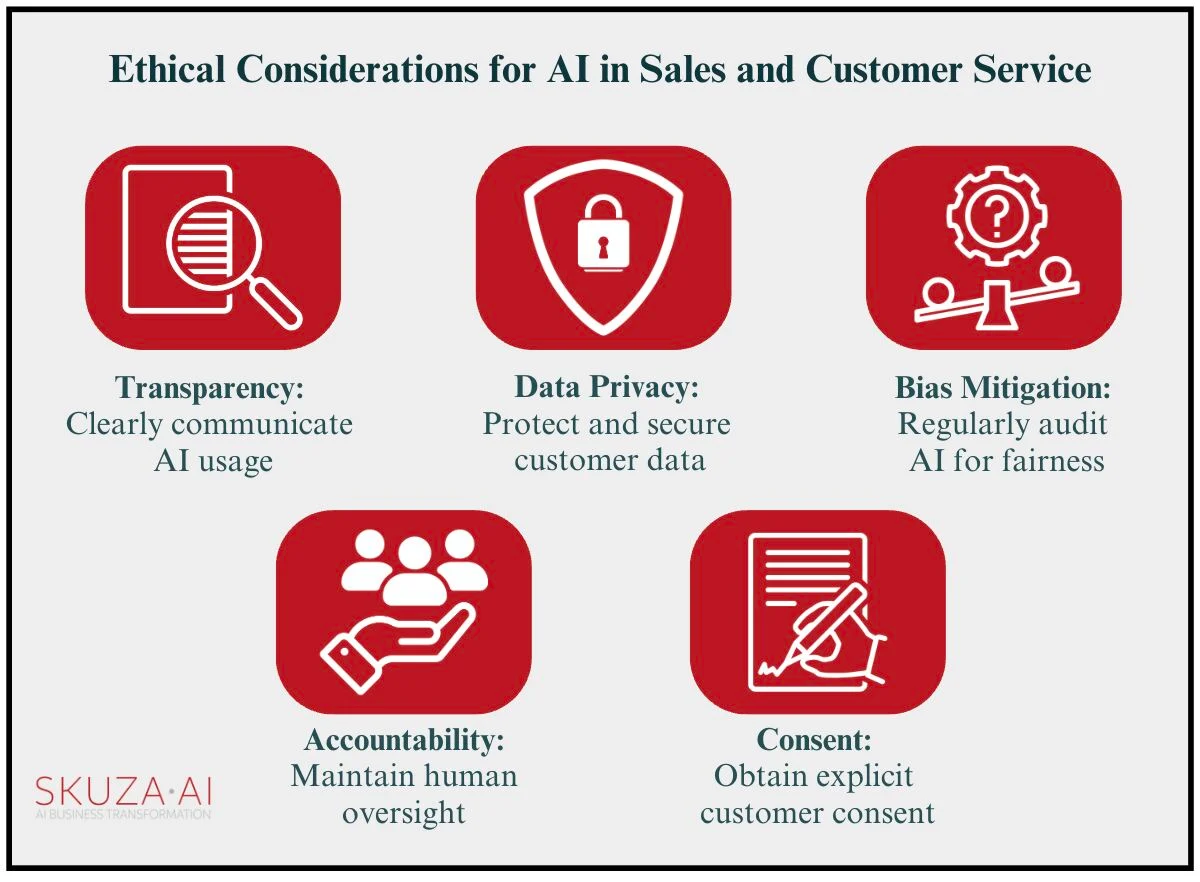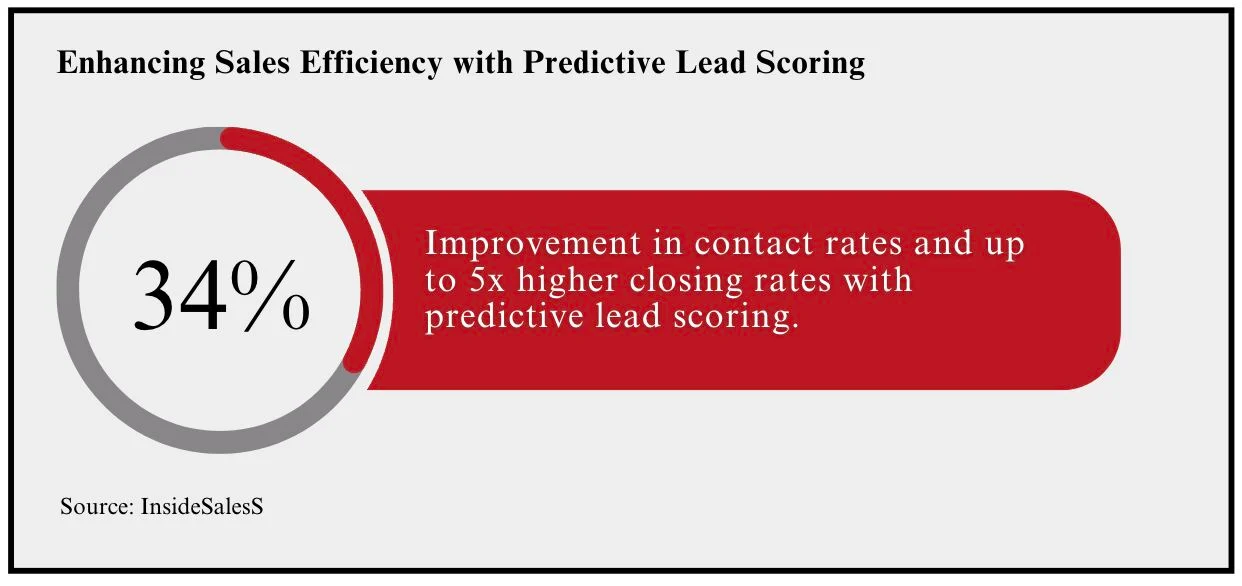As the sales and customer service landscapes evolve, AI-driven predictive lead scoring emerges as a game-changer, providing superior accuracy and efficiency. Concurrently, the ethical integration of AI—emphasizing transparency, data protection, and bias mitigation—is vital for sustaining trust and fostering robust customer relationships.
Focusing on these elements ensures businesses can excel in a data-driven future.
The Impact of AI-Driven Predictive Lead Scoring
As we transition into a new era of sales, traditional lead scoring methods have proven insufficient. The reliance on outdated techniques necessitates a radical shift towards AI-driven predictive lead scoring, which represents a transformative leap.
AI-powered lead scoring transcends incremental improvements by leveraging machine learning to analyze extensive datasets. This predictive capability enables sales teams to prioritize high-value opportunities with unparalleled accuracy.
Benefits of AI-Driven Predictive Lead Scoring
- Enhanced Accuracy and Conversion RatesAI algorithms analyze vast amounts of data to predict lead conversion likelihood with high precision, resulting in superior lead scoring accuracy compared to traditional methods.
Example: Implementing predictive lead scoring can increase closing rates up to five times higher than the baseline and improve contact rates by up to 34% (InsideSales).

- Improved Efficiency and FocusAI identifies high-value leads, allowing sales teams to concentrate their efforts where success is most probable, thereby enhancing overall efficiency and effectiveness.
Forrester Research reports that companies using AI for lead scoring experienced a 35% improvement in lead-to-deal conversion rates.
- Data-Driven Decision MakingAI-driven predictive lead scoring provides actionable insights through data analysis, enabling informed and strategic decision-making.
Example: AI tools utilize machine learning to analyze customer behaviors and interactions, offering insights that help sales teams tailor their approach to each lead.
Addressing Concerns and Ensuring Success
While AI’s potential is substantial, its adoption is not without debate. Critics argue that AI could dehumanize sales and perpetuate biases. However, when thoughtfully implemented, AI augments human decision-making with data-driven insights rather than replacing it.
Strategies for Successful AI Integration:
- Integrate AI Tools with Your CRM: Ensure that AI tools seamlessly integrate with existing CRM systems to maintain a cohesive workflow.
- Clean Your Data: The accuracy of AI predictions depends on data quality. Ensure data is accurate and comprehensive.
- Continuous Monitoring: Regularly update and refine AI models to enhance accuracy and reduce biases. Monitoring performance helps adapt to market conditions and improve lead scoring.
Making an Informed Decision
Careful evaluation of these factors enables businesses to select and implement an AI-driven predictive lead scoring system that enhances sales operations. Relying solely on traditional methods can lead to suboptimal outcomes. Instead, thorough assessment ensures that the chosen AI solution aligns with organizational goals and operational realities.
Ethical AI in Sales and Customer Service: Balancing Innovation with Responsibility
AI is revolutionizing sales and customer service, offering unprecedented efficiencies and capabilities. However, with great power comes great responsibility. It is essential to navigate this technological transformation ethically to maintain trust and ensure fair practices.
Key Ethical Considerations:
- Transparency is KeyTransparency is fundamental in fostering trust with customers. Informing customers when they are interacting with an AI bot builds trust through honesty. According to Deloitte, transparency significantly enhances trust, with 86% of leaders affirming that greater transparency increases workforce trust.
- Guard That DataProtecting customer information is paramount. Implement robust security measures and comply rigorously with privacy laws. Deloitte emphasizes that safeguarding customer data not only ensures regulatory compliance but also builds customer trust and loyalty.
- Fight the BiasAI systems can inadvertently perpetuate biases. Regularly auditing and refining algorithms is crucial to ensure fairness and impartiality. Addressing biases helps maintain equitable customer interactions and avoids potential reputational risks.
- Human TouchMaintain a balance between AI and human intervention. AI should assist, not replace, human capabilities, ensuring a seamless customer experience. Combining AI with human oversight leads to higher efficiency and customer satisfaction.
- Get ConsentAlways seek explicit consent before using customer data. Simplify the process for customers to opt in or out of data usage. Transparent data practices are essential for building a strong foundation of trust with customers.

Ethical AI: A Good Practice and Good Business
Implementing ethical AI practices is not only a moral obligation but also a strategic business decision. Demonstrating a commitment to responsible AI usage can significantly enhance customer loyalty and brand reputation.
Conclusion
Ethical AI in sales and customer service is about transparency, data protection, bias mitigation, human oversight, and informed consent. By adhering to these principles, businesses can navigate the AI transformation responsibly, fostering trust and strengthening customer relationships. Making responsible AI choices is not just good practice; it’s good business.
Did you find it interesting? Subscribe to my newsletter for more weekly insights:
[mailerlite_form form_id=9]


